health vocabulary 关于健康英语词汇
和health有关的英文单词
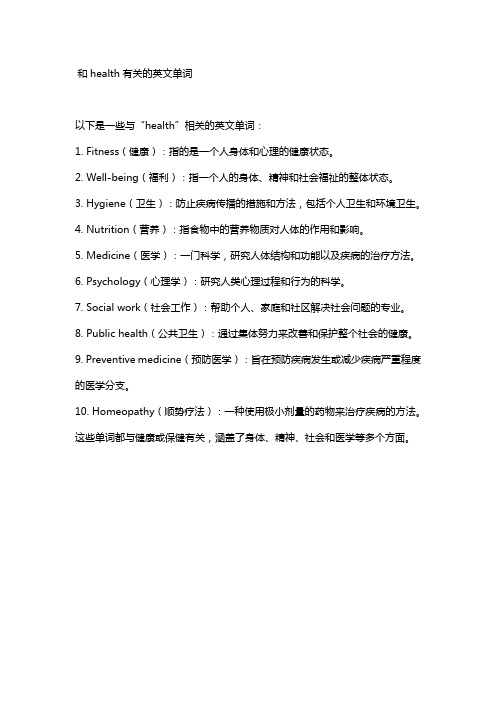
和health有关的英文单词
以下是一些与“health”相关的英文单词:
1. Fitness(健康):指的是一个人身体和心理的健康状态。
2. Well-being(福利):指一个人的身体、精神和社会福祉的整体状态。
3. Hygiene(卫生):防止疾病传播的措施和方法,包括个人卫生和环境卫生。
4. Nutrition(营养):指食物中的营养物质对人体的作用和影响。
5. Medicine(医学):一门科学,研究人体结构和功能以及疾病的治疗方法。
6. Psychology(心理学):研究人类心理过程和行为的科学。
7. Social work(社会工作):帮助个人、家庭和社区解决社会问题的专业。
8. Public health(公共卫生):通过集体努力来改善和保护整个社会的健康。
9. Preventive medicine(预防医学):旨在预防疾病发生或减少疾病严重程度的医学分支。
10. Homeopathy(顺势疗法):一种使用极小剂量的药物来治疗疾病的方法。
这些单词都与健康或保健有关,涵盖了身体、精神、社会和医学等多个方面。
大学英语开口说健康4.3 词汇—健康
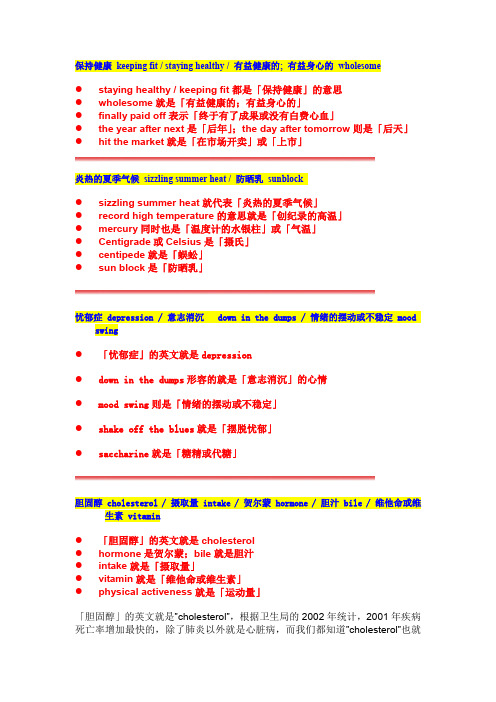
保持健康keeping fit / staying healthy / 有益健康的; 有益身心的wholesome●staying healthy / keeping fit都是「保持健康」的意思●wholesome就是「有益健康的;有益身心的」●finally paid off表示「终于有了成果或没有白费心血」●the year after next是「后年」;the day after tomorrow则是「后天」●hit the market就是「在市场开卖」或「上市」炎热的夏季气候sizzling summer heat / 防晒乳sunblock●sizzling summer heat就代表「炎热的夏季气候」●record high temperature的意思就是「创纪录的高温」●mercury同时也是「温度计的水银柱」或「气温」●Centigrade或Celsius是「摄氏」●centipede就是「蜈蚣」●sun block是「防晒乳」忧郁症 depression / 意志消沉 down in the dumps / 情绪的摆动或不稳定 mood swing●「忧郁症」的英文就是depression●down in the dumps形容的就是「意志消沉」的心情●mood swing则是「情绪的摆动或不稳定」●shake off the blues就是「摆脱忧郁」●saccharine就是「糖精或代糖」胆固醇 cholesterol / 摄取量 intake / 贺尔蒙 hormone / 胆汁 bile / 维他命或维生素 vitamin●「胆固醇」的英文就是cholesterol●hormone是贺尔蒙;bile就是胆汁●intake就是「摄取量」●vitamin就是「维他命或维生素」●physical activeness就是「运动量」「胆固醇」的英文就是”cholesterol”,根据卫生局的2002年统计,2001年疾病死亡率增加最快的,除了肺炎以外就是心脏病,而我们都知道”cholesterol”也就是「胆固醇」高的人,会有比较高的心脏病发作机率。
健康与医疗英语词汇大全
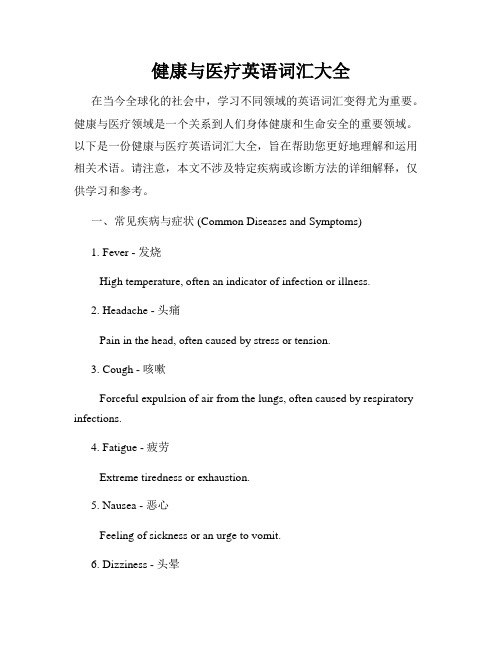
健康与医疗英语词汇大全在当今全球化的社会中,学习不同领域的英语词汇变得尤为重要。
健康与医疗领域是一个关系到人们身体健康和生命安全的重要领域。
以下是一份健康与医疗英语词汇大全,旨在帮助您更好地理解和运用相关术语。
请注意,本文不涉及特定疾病或诊断方法的详细解释,仅供学习和参考。
一、常见疾病与症状 (Common Diseases and Symptoms)1. Fever - 发烧High temperature, often an indicator of infection or illness.2. Headache - 头痛Pain in the head, often caused by stress or tension.3. Cough - 咳嗽Forceful expulsion of air from the lungs, often caused by respiratory infections.4. Fatigue - 疲劳Extreme tiredness or exhaustion.5. Nausea - 恶心Feeling of sickness or an urge to vomit.6. Dizziness - 头晕Feeling unsteady, often accompanied by a spinning sensation.7. Rash - 皮疹An outbreak of red or purple spots on the skin, often accompanied by itching.8. Diarrhea - 腹泻Frequent, loose, or watery stools.9. Vomiting - 呕吐Forceful expulsion of stomach contents through the mouth.10. Stomachache - 胃痛Pain or discomfort in the abdomen.二、医疗基础设施 (Medical Facilities)1. Hospital - 医院Institution providing medical and surgical treatment for the sick or injured.2. Clinic - 诊所Medical facility where patients receive outpatient treatment or consultation.3. Pharmacy - 药店Retail store where medicines and medical supplies can be purchased.4. Laboratory - 实验室Facility where medical tests and experiments are conducted for diagnostic purposes.5. Ambulance - 救护车Emergency vehicle used to transport patients, often equipped with life-supporting equipment.6. Emergency Room - 急诊室Department in a hospital that provides immediate medical treatment for acute injuries or illnesses.7. Operating Room - 手术室Specialized facility in a hospital where surgical procedures are performed.8. X-ray Room - X光室Room equipped with X-ray machines to obtain images of the internal structures of the body.三、医疗人员 (Medical Professionals)1. Doctor/Physician - 医生Qualified medical professional who diagnoses, treats, and provides medical care to patients.2. Nurse - 护士Healthcare professional who assists doctors and provides direct patient care.3. Surgeon - 外科医生Doctor specializing in surgical procedures.4. Dentist - 牙医Medical professional who diagnoses and treats oral health problems.5. Pharmacist - 药剂师Healthcare professional who prepares and dispenses medications.6. Medical Researcher - 医学研究人员Scientist or researcher who conducts medical studies and experiments.四、医学检查与治疗方法 (Medical Examinations and Treatments)1. Physical Examination - 体检Comprehensive assessment of a patient's overall health status.2. Blood Test - 血液检查Analysis of a blood sample to diagnose and monitor certain medical conditions.3. X-ray - X光片Radiographic image obtained by exposing the body to X-rays, used for diagnostic purposes.4. Ultrasound - 超声检查Imaging technique that uses high-frequency sound waves to create real-time images of internal organs.5. MRI (Magnetic Resonance Imaging) - 磁共振成像Imaging technique that uses strong magnetic fields and radio waves to generate detailed images of the body.6. Surgery - 外科手术Medical procedure performed to treat or repair a diseased or injured part of the body.7. Medication - 药物Substances used to treat, cure, or prevent diseases or medical conditions.养生与健康 (Wellness and Health)1. Exercise - 锻炼Physical activity performed to improve strength, endurance, or overall fitness.2. Balanced Diet - 均衡饮食Eating plan that includes a variety of nutrients in appropriate proportions.3. Stress Management - 压力管理Techniques and activities to reduce or cope with stress.4. Adequate Sleep - 充足睡眠Sufficient amount of sleep required to maintain good health and well-being.5. Hydration - 补水The process of replenishing the body with adequate fluids to maintain optimal functioning.6. Mental Health - 心理健康Emotional and psychological well-being.7. Preventive Care - 预防保健Measures taken to prevent illness or disease, such as vaccinations or regular check-ups.总结 (Conclusion)以上是一份健康与医疗英语词汇大全,涵盖了常见疾病、医疗基础设施、医疗人员以及医学检查与治疗方法等方面的词汇。
健康英语词汇大全了解健康问题及医疗知识加深健康话题讨论

健康英语词汇大全了解健康问题及医疗知识加深健康话题讨论健康是每个人追求的目标,无论是身体健康还是心理健康。
因此,掌握健康相关的英语词汇是非常重要的。
本文将为您介绍一些常用的健康英语词汇,同时探讨一些健康话题并深入了解医疗知识。
一、健康英语词汇1. Physical Health:身体健康Physical health refers to the overall well-being of the body, including physical fitness, strength, and the absence of disease or illness.2. Mental Health:心理健康Mental health refers to a person's emotional and psychological well-being, including their ability to cope with stress and maintain positive relationships.3. Nutrition:营养Nutrition is the process of providing the necessary nutrients to the body through food and drinks. A balanced diet is essential for maintaining good health.4. Exercise:锻炼Exercise involves physical activity that is performed to improve or maintain physical fitness and overall health. It can include activities such as jogging, swimming, or weightlifting.5. Hygiene:卫生Hygiene refers to practices that are undertaken to maintain cleanliness and prevent the spread of disease. This includes activities such as handwashing, dental care, and regular bathing.6. Prevention:预防Prevention involves measures that are taken to reduce the risk of developing a disease or illness. This can include vaccinations, regular check-ups, and healthy lifestyle choices.7. Symptoms:症状Symptoms are the physical or mental changes that are experienced as a result of an illness or condition. Common symptoms include fever, cough, headache, and fatigue.8. Diagnosis:诊断Diagnosis is the process of identifying a disease or condition based on a patient's symptoms, medical history, and physical examination. This is typically carried out by a healthcare professional.9. Treatment:治疗Treatment refers to the medical care that is provided to a patient to alleviate or cure a disease or condition. This can include medication, surgery, or therapy.10. Rehabilitation:康复Rehabilitation is the process of restoring a person's physical or mental abilities after an illness or injury. It may involve exercises, therapy, or assistive devices.二、健康话题讨论1. The Importance of a Healthy Lifestyle:健康生活方式的重要性Living a healthy lifestyle is crucial for both physical and mental well-being. It involves making conscious choices regarding diet, exercise, and stress management. Discussing the benefits of a healthy lifestyle can encourage others to adopt positive habits.2. Mental Health Awareness:心理健康意识Mental health issues are becoming increasingly prevalent in today's society. Discussing the importance of mental health awareness and the need to eliminate the stigma surrounding it can contribute to a more supportive and inclusive environment.3. Common Illnesses and Prevention Strategies:常见疾病及预防策略Educating others about common illnesses, such as the flu or cold, and the importance of prevention strategies, such as handwashing and vaccination, can help reduce the spread of infectious diseases and promote overall health.4. Healthy Eating Habits:健康饮食习惯Promoting healthy eating habits, such as consuming a balanced diet rich in fruits, vegetables, and whole grains, can contribute to the prevention of chronic diseases, such as obesity, diabetes, and cardiovascular diseases.5. Exercise and Physical Fitness:运动和身体健康Encouraging regular physical activity and discussing the benefits of exercise, such as improved cardiovascular health, weight management, and stress reduction, can motivate others to incorporate exercise into their daily routines.三、医疗知识1. Understanding Common Medical Terms:了解常见医学术语Familiarizing oneself with common medical terms can help individuals better understand medical discussions and communicate effectively with healthcare professionals.2. First Aid Techniques:急救技巧Learning basic first aid techniques, such as CPR and wound care, can be valuable in emergency situations and potentially save lives.3. Recognizing Mental Health Disorders:识别心理健康障碍Increasing awareness of mental health disorders, such as depression, anxiety, and bipolar disorder, can help individuals seek timely treatment and support those in need.4. Benefits of Regular Check-ups:定期体检的好处Regular check-ups are essential for detecting early signs of diseases or conditions and maintaining overall health. Discussing the benefits of regular check-ups can encourage others to prioritize their health.5. Holistic Approaches to Healthcare:整体医疗方法Exploring alternative and complementary approaches to healthcare, such as acupuncture or herbal medicine, can provide individuals with a broader understanding of treatment options.通过学习健康英语词汇,加深对健康话题的讨论及了解医疗知识,我们可以更好地管理和维护自己的健康。
健康英语词汇大全深入解析健康领域的专业术语关注健康生活
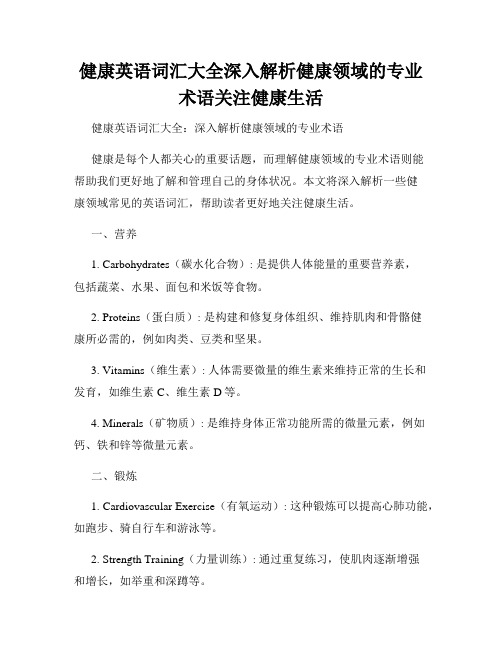
健康英语词汇大全深入解析健康领域的专业术语关注健康生活健康英语词汇大全:深入解析健康领域的专业术语健康是每个人都关心的重要话题,而理解健康领域的专业术语则能帮助我们更好地了解和管理自己的身体状况。
本文将深入解析一些健康领域常见的英语词汇,帮助读者更好地关注健康生活。
一、营养1. Carbohydrates(碳水化合物): 是提供人体能量的重要营养素,包括蔬菜、水果、面包和米饭等食物。
2. Proteins(蛋白质): 是构建和修复身体组织、维持肌肉和骨骼健康所必需的,例如肉类、豆类和坚果。
3. Vitamins(维生素): 人体需要微量的维生素来维持正常的生长和发育,如维生素C、维生素D等。
4. Minerals(矿物质): 是维持身体正常功能所需的微量元素,例如钙、铁和锌等微量元素。
二、锻炼1. Cardiovascular Exercise(有氧运动): 这种锻炼可以提高心肺功能,如跑步、骑自行车和游泳等。
2. Strength Training(力量训练): 通过重复练习,使肌肉逐渐增强和增长,如举重和深蹲等。
3. Flexibility Exercise(柔韧性训练): 这种锻炼有助于提高关节灵活性和肌肉伸展度,如瑜伽和拉伸运动等。
三、心理健康1. Stress(压力): 是指在面对挑战或紧张情况下,身体和心理所产生的紧张感。
2. Meditation(冥想): 通过冥想可以达到身心放松、减轻压力和提高专注力的效果。
3. Mindfulness(正念): 是指倾听自己的感受、思维和情绪,以及周围环境的觉察,有助于提高专注和减少压力。
四、疾病与治疗1. Chronic Disease(慢性疾病): 指存在较长时间的疾病,如高血压、糖尿病和哮喘等。
2. Vaccination(接种疫苗): 通过接种疫苗可以预防一些传染病,如流感和麻疹。
3. Therapy(疗法): 是指通过心理、物理或药物的治疗来改善疾病或疼痛症状。
高中英语备课参考 Health Vocabulary and speaking
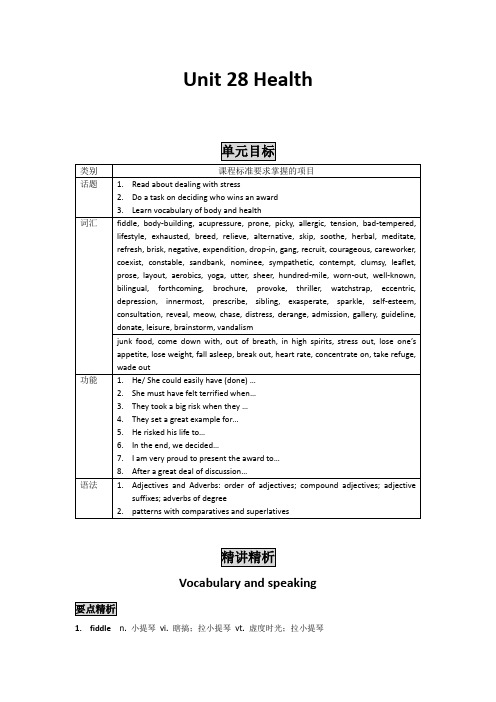
Unit 28 HealthVocabulary and speaking1.fiddle n. 小提琴vi. 瞎搞;拉小提琴vt. 虚度时光;拉小提琴He gave us a tune on his fiddle.他用小提琴给我们奏了一个曲子。
He has to play the second fiddle.他不得不充当副手。
You shall not fiddle away your spare time.你不该浪费你的业余时间。
I have been told you, don't fiddle with my thing.我早已经告诉过你--不要乱动我的东西!Being a modest person,he was content to play second fiddle to others.作为一个谦虚者,他愿意居于他人的次要位置。
2.body-building n. 健美运动;加强体质He often goes to the gym for body-building .他经常去健身房练健美。
Body-building exercises are, to a certain extent, related to the basic pulse.健美操运动与基础脉搏有一定的联系。
In addition, the leisure and body-building rooms are the best places for you to relax.酒店的休闲健身场所为您提供绝好的身心放松空间。
On the semester, maybe I nearly have not attended class for that match of body-building exercises.上学期,为了那个健美操大赛,可以说我等于就是没有上课。
Body-building Qigong is a traditional method to keep in a good health,and it is drawing common people s attention.健身气功作为我国传统的养生保健的方法,正在被世人所关注。
管综英语词汇

管综英语词汇管综英语词汇(Comprehensive English Vocabulary)是指涉及各个领域的英语词汇。
以下是一些常用的管综英语词汇:1. Business(商业):company, marketing, sales, finance, management, investment, profit, strategy, competition, entrepreneur- 公司,市场营销,销售,财务,管理,投资,利润,战略,竞争,企业家2. Education(教育):school, teacher, student, curriculum, exam, grade, university, research, knowledge, learning- 学校,教师,学生,课程,考试,成绩,大学,研究,知识,学习3. Health(健康):doctor, hospital, medicine, patient, disease, treatment, prevention, nutrition, exercise, lifestyle- 医生,医院,药物,病人,疾病,治疗,预防,营养,运动,生活方式4. Environment(环境):climate change, pollution, conservation, sustainability, renewable energy, recycling, biodiversity, deforestation, carbon footprint, waste management- 气候变化,污染,保护,可持续性,可再生能源,回收,生物多样性,森林砍伐,碳足迹,废物管理5. Technology(技术):internet, computer, smartphone, software, hardware, digital, social media, artificial intelligence,virtual reality, automation- 互联网,电脑,智能手机,软件,硬件,数字化,社交媒体,人工智能,虚拟现实,自动化6. Politics(政治):government, president, democracy, election, policy, legislation, diplomacy, power, corruption, international relations- 政府,总统,民主,选举,政策,立法,外交,权力,腐败,国际关系7. Culture(文化):art, music, literature, film, theater, religion, tradition, language, customs, heritage- 艺术,音乐,文学,电影,剧院,宗教,传统,语言,风俗习惯,文化遗产8. Science(科学):biology, chemistry, physics, mathematics, experiment, hypothesis, research, theory, discovery, innovation- 生物学,化学,物理学,数学,实验,假设,研究,理论,发现,创新这只是管综英语词汇的一小部分,实际上还有很多其他的领域和相关词汇。
vocabulary for ells 21个主题英语词汇
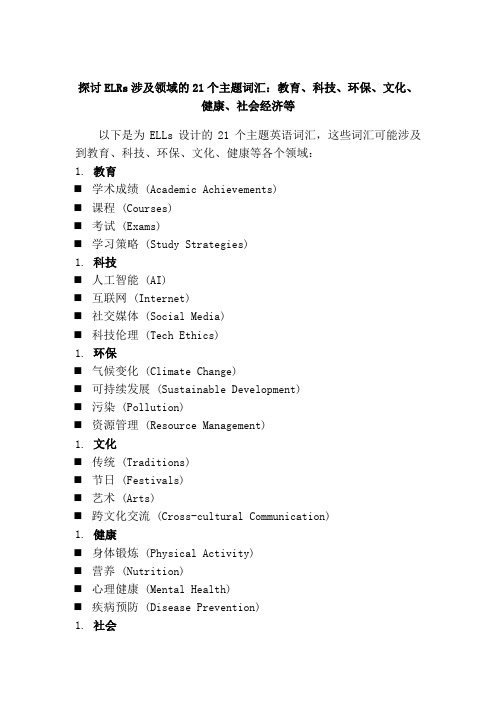
探讨ELRs涉及领域的21个主题词汇:教育、科技、环保、文化、健康、社会经济等以下是为ELLs设计的21个主题英语词汇,这些词汇可能涉及到教育、科技、环保、文化、健康等各个领域:1.教育⏹学术成绩 (Academic Achievements)⏹课程 (Courses)⏹考试 (Exams)⏹学习策略 (Study Strategies)1.科技⏹人工智能 (AI)⏹互联网 (Internet)⏹社交媒体 (Social Media)⏹科技伦理 (Tech Ethics)1.环保⏹气候变化 (Climate Change)⏹可持续发展 (Sustainable Development)⏹污染 (Pollution)⏹资源管理 (Resource Management)1.文化⏹传统 (Traditions)⏹节日 (Festivals)⏹艺术 (Arts)⏹跨文化交流 (Cross-cultural Communication)1.健康⏹身体锻炼 (Physical Activity)⏹营养 (Nutrition)⏹心理健康 (Mental Health)⏹疾病预防 (Disease Prevention)1.社会⏹社会问题 (Social Issues)⏹社区 (Community)⏹多样性 (Diversity)⏹社会公正是 (Social Justice)1.经济⏹职业 (Careers)⏹收入 (Income)⏹经济全球化 (Globalization)⏹金融 (Finance)1.个人发展⏹自我效能感 (Self-efficacy)⏹人际关系 (Relationships)⏹自我提升 (Personal Development)⏹人生目标 (Life Goals)1.娱乐与休闲⏹电影与电视 (Movies & TV)⏹音乐 (Music)⏹游戏 (Gaming)⏹旅游 (Travel)1.交通与出行⏹交通工具 (Transportation)⏹道路安全 (Road Safety)⏹出游方式 (Travel Methods)⏹行李处理 (Baggage Handling)。
健康英语词汇大全了解健康与医疗的专业术语
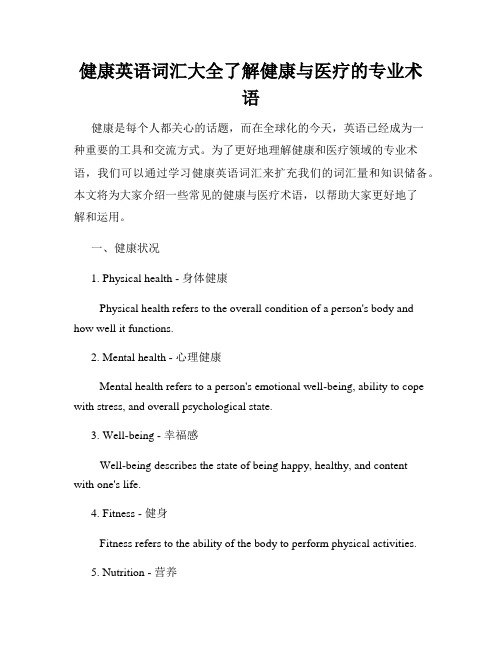
健康英语词汇大全了解健康与医疗的专业术语健康是每个人都关心的话题,而在全球化的今天,英语已经成为一种重要的工具和交流方式。
为了更好地理解健康和医疗领域的专业术语,我们可以通过学习健康英语词汇来扩充我们的词汇量和知识储备。
本文将为大家介绍一些常见的健康与医疗术语,以帮助大家更好地了解和运用。
一、健康状况1. Physical health - 身体健康Physical health refers to the overall condition of a person's body and how well it functions.2. Mental health - 心理健康Mental health refers to a person's emotional well-being, ability to cope with stress, and overall psychological state.3. Well-being - 幸福感Well-being describes the state of being happy, healthy, and contentwith one's life.4. Fitness - 健身Fitness refers to the ability of the body to perform physical activities.5. Nutrition - 营养Nutrition is the process of providing the body with the necessary substances for growth, maintenance, and repair.二、常见疾病与症状1. Allergy - 过敏An allergy is an immune response to a substance that is usually harmless. Common allergies include pollen, dust, and certain foods.2. Asthma - 哮喘Asthma is a chronic respiratory condition that causes difficulty in breathing, wheezing, and coughing.3. Diabetes - 糖尿病Diabetes is a condition that affects the body's ability to regulate blood sugar levels. It can result in high blood sugar (hyperglycemia) or low blood sugar (hypoglycemia).4. Hypertension - 高血压Hypertension, or high blood pressure, is a condition in which the force of blood against the artery walls is too high.5. Fever - 发烧Fever is a temporary increase in body temperature, often accompanied by symptoms such as sweating, chills, and fatigue. It is a sign that the body is fighting off an infection.6. Headache - 头痛A headache is a pain or discomfort in the head or neck region. It can be caused by various factors, such as tension, stress, or a medical condition.三、医疗机构与专业人员1. Hospital - 医院A hospital is a medical institution where patients receive diagnosis, treatment, and care for various illnesses and injuries.2. Clinic - 诊所A clinic is a healthcare facility that provides medical services and treats minor illnesses and injuries.3. Doctor - 医生A doctor is a qualified medical professional who diagnoses and treats illnesses, provides medical advice, and prescribes medication.4. Nurse - 护士A nurse is a healthcare professional who assists doctors and provides care for patients, such as administering medication, monitoring vital signs, and offering emotional support.5. Pharmacist - 药剂师A pharmacist is a healthcare professional who dispenses medications, provides information on drug usage, and offers advice on maintaining optimal health.四、常用诊断方法与治疗1. X-ray - X光X-ray is a diagnostic imaging technique that uses electromagnetic waves to create images of the internal structures of the body.2. Blood test - 血液检查A blood test is a laboratory analysis of a blood sample to evaluate various aspects of a person's health, such as blood cell count, cholesterol levels, and organ function.3. Prescription - 处方A prescription is a written order from a doctor for a specific medication or treatment.4. Surgery - 手术Surgery is a medical procedure that involves invasive techniques to repair, remove, or replace diseased or damaged tissues or organs.5. Rehabilitation - 康复Rehabilitation is a process of restoring physical and mental health after an illness, injury, or surgery through exercises, therapy, and lifestyle modifications.通过学习以上这些健康与医疗术语,我们可以更好地理解和运用英语,进一步提升我们的健康意识和医疗素养。
与健康有关的英语词汇

与健康有关的英语词汇 Ting Bao was revised on January 6, 20021c r i p p l e跛腿fracture骨折sub-health 亚健康body-ache 身体疼痛high stress level高度精神紧张anxiety 焦虑physical disorder 身体不适; stress 压力fear 恐惧fatigue 疲劳bad temper 暴躁overload 负担过重neglect of exercise 缺乏运动overfatigue 疲劳过度sleep disorders 睡眠失常depression 抑郁obesity 肥胖insomnia 失眠listlessness 无精打采dizziness 头晕眼花vertigo 眩晕lack of appetite 食欲不振hypertension 高血压cholesterol 胆固醇digestive system 消化系统cough 咳嗽asthma 哮喘pneumonia 肺炎heart disease 心脏病indigestion 消化不良heat stroke 中暑itching 发痒chronic 慢性病symptom症状eyedrops眼药水vitamin维他命medication药物in good health /in bad health 身体好[坏]in poor health 身体好[坏]inquire after sb.'s health 问安, 问候recover one's health 恢复健康restore one's health 恢复健康regular check-up / health checks 定期体检keep fit保持健康public health 公共卫生diet 日常饮食health care?卫生保健blood donation献血gym 体育训练medicare 医疗保险free- medicare 公费医疗保险medical exam = medical examination?体检, 体格检查yoga 瑜珈。
医疗健康英语词汇大全增加你对医疗健康的英语词汇量和专业知识
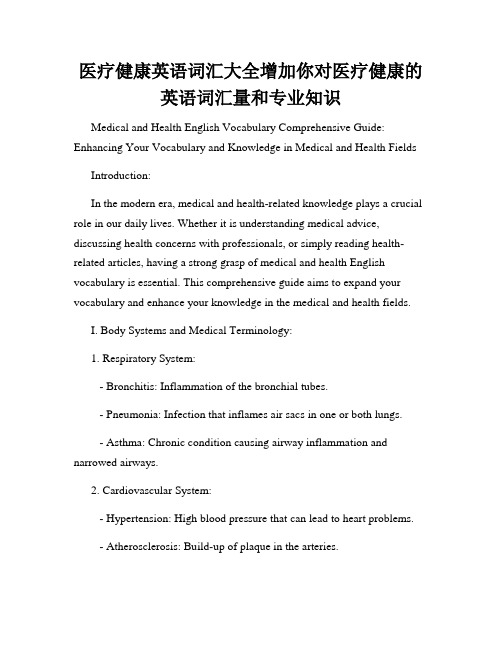
医疗健康英语词汇大全增加你对医疗健康的英语词汇量和专业知识Medical and Health English Vocabulary Comprehensive Guide: Enhancing Your Vocabulary and Knowledge in Medical and Health FieldsIntroduction:In the modern era, medical and health-related knowledge plays a crucial role in our daily lives. Whether it is understanding medical advice, discussing health concerns with professionals, or simply reading health-related articles, having a strong grasp of medical and health English vocabulary is essential. This comprehensive guide aims to expand your vocabulary and enhance your knowledge in the medical and health fields.I. Body Systems and Medical Terminology:1. Respiratory System:- Bronchitis: Inflammation of the bronchial tubes.- Pneumonia: Infection that inflames air sacs in one or both lungs.- Asthma: Chronic condition causing airway inflammation and narrowed airways.2. Cardiovascular System:- Hypertension: High blood pressure that can lead to heart problems.- Atherosclerosis: Build-up of plaque in the arteries.- Myocardial Infarction: Heart attack caused by a blocked blood supply to the heart.3. Digestive System:- Gastritis: Inflammation of the stomach lining.- Hepatitis: Inflammation of the liver, usually caused by a virus.- Gastroesophageal Reflux Disease (GERD): Chronic acid reflux that can lead to complications.4. Nervous System:- Alzheimer's Disease: Progressive brain disorder affecting memory and cognitive functions.- Epilepsy: Neurological disorder characterized by recurring seizures.- Parkinson's Disease: Degenerative disorder of the nervous system affecting movement.II. Common Symptoms and Conditions:1. Symptoms:- Fever: An elevated body temperature, often a sign of an underlying infection.- Fatigue: Feeling of tiredness or lack of energy.- Headache: Pain or discomfort in the head.2. Conditions:- Diabetes: Chronic condition resulting in high blood sugar levels.- Arthritis: Inflammation of one or more joints, causing pain and stiffness.- Depression: Mental health disorder characterized by persistent sadness.III. Medical Professionals and Specialized Fields:1. Medical Professionals:- General Practitioner (GP): Primary care physician providing general medical care.- Cardiologist: Specialist in treating diseases and conditions of the heart.- Dentist: Healthcare professional specializing in oral health and dental care.2. Specialized Fields:- Radiology: Medical imaging and diagnosis using techniques such as X-rays and MRI.- Oncology: Branch of medicine focusing on the prevention, diagnosis, and treatment of cancer.- Pediatrics: Branch of medicine concerned with the health and development of children.IV. Healthcare Facilities and Services:1. Healthcare Facilities:- Hospital: Institution providing medical, surgical, and emergency services.- Clinic: Healthcare facility where patients receive specialized medical treatment or consultations.- Pharmacy: Facility where prescription medications and over-the-counter drugs are dispensed.2. Services:- Vaccination: Administration of vaccines to prevent specific diseases.- Physical Therapy: Rehabilitation and treatment for physical injuries or conditions.- Counselling: Professional guidance and support for mental health concerns.V. Medical Procedures and Treatments:1. Procedures:- Biopsy: Removal of tissue or cells for examination and diagnosis.- Colonoscopy: Examination of the colon and rectum using a flexible tube with a camera.- Electrocardiogram (ECG): Test recording the electrical activity of the heart.2. Treatments:- Chemotherapy: Treatment using drugs to destroy or slow down the growth of cancer cells.- Radiation Therapy: Treatment using high-energy rays to kill cancer cells.- Antibiotics: Medications used to treat bacterial infections.Conclusion:Expanding your medical and health English vocabulary is vital for effective communication and understanding in these fields. This comprehensive guide has provided a glimpse into various body systems, common symptoms, medical professionals, healthcare facilities, and procedures. By continually learning and incorporating new vocabulary, you can enhance your expertise and confidently navigate the medical and health landscape in English. Remember, a strong vocabulary is the foundation for success in the medical and health fields.。
健康饮食英语词汇大全掌握营养成分饮食习惯和健康饮食的英文表达
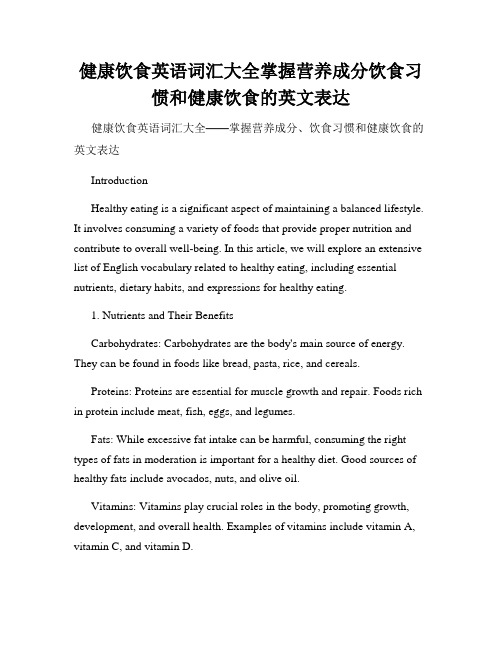
健康饮食英语词汇大全掌握营养成分饮食习惯和健康饮食的英文表达健康饮食英语词汇大全——掌握营养成分、饮食习惯和健康饮食的英文表达IntroductionHealthy eating is a significant aspect of maintaining a balanced lifestyle. It involves consuming a variety of foods that provide proper nutrition and contribute to overall well-being. In this article, we will explore an extensive list of English vocabulary related to healthy eating, including essential nutrients, dietary habits, and expressions for healthy eating.1. Nutrients and Their BenefitsCarbohydrates: Carbohydrates are the body's main source of energy. They can be found in foods like bread, pasta, rice, and cereals.Proteins: Proteins are essential for muscle growth and repair. Foods rich in protein include meat, fish, eggs, and legumes.Fats: While excessive fat intake can be harmful, consuming the right types of fats in moderation is important for a healthy diet. Good sources of healthy fats include avocados, nuts, and olive oil.Vitamins: Vitamins play crucial roles in the body, promoting growth, development, and overall health. Examples of vitamins include vitamin A, vitamin C, and vitamin D.Minerals: Minerals, such as calcium and iron, are necessary for various bodily functions, including bone health and oxygen transport.Fiber: Fiber aids digestion, helps maintain a healthy weight, and reduces the risk of certain diseases. It is found in fruits, vegetables, and whole grains.2. Healthy Eating HabitsPortion Control: Controlling portion sizes helps manage calorie intake and prevents overeating.Balanced Diet: A balanced diet involves consuming the right amounts of different food groups to ensure adequate nutrition.Eating Regularly: Eating regular meals and snacks throughout the day helps maintain steady energy levels and prevents excessive hunger.Hydration: Staying hydrated is crucial for overall health. Drinking an adequate amount of water daily is essential.Limiting Processed Foods: Processed foods often contain high levels of salt, sugar, and unhealthy fats. It is important to limit their consumption.5-a-Day: The "5-a-day" guideline suggests eating at least five servings of fruits and vegetables daily for optimal health.3. Expressions for Healthy EatingEat Clean: This phrase refers to consuming unprocessed, wholesome foods and avoiding highly processed ones.Mindful Eating: Mindful eating involves being fully present and conscious of one's eating experience, focusing on the taste, texture, and enjoyment of food.Superfoods: Superfoods are nutrient-dense foods that offer exceptional health benefits. Examples include blueberries, kale, and quinoa.Ditch Junk Food: This expression suggests avoiding unhealthy snack foods like chips, soda, and candy.Go Organic: Going organic means choosing foods that are grown without the use of chemical pesticides and fertilizers.ConclusionMaintaining a healthy diet is an essential component of a balanced lifestyle. By familiarizing yourself with the vocabulary related to healthy eating, you will be better equipped to understand and discuss the importance of proper nutrition. Remember to embrace a variety of foods, practice portion control, and develop healthy eating habits to support your overall well-being.。
关于健康的单词
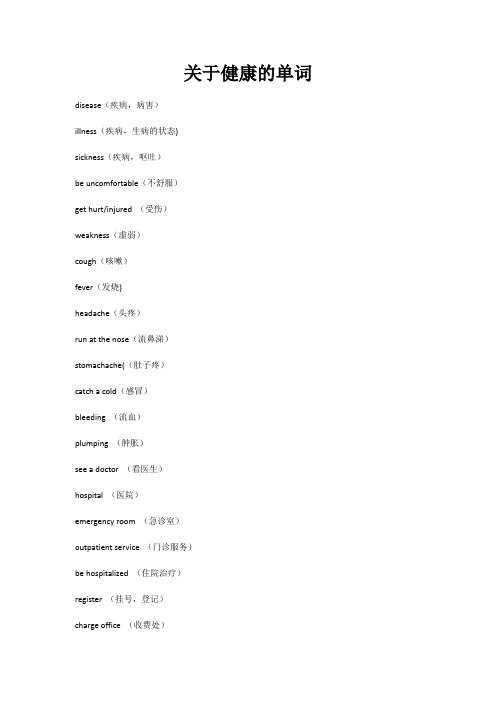
关于健康的单词disease(疾病,病害)illness(疾病,生病的状态)sickness(疾病,呕吐)be uncomfortable(不舒服)get hurt/injured (受伤)weakness(虚弱)cough(咳嗽)fever(发烧)headache(头疼)run at the nose(流鼻涕)stomachache((肚子疼)catch a cold(感冒)bleeding (流血)plumping (肿胀)see a doctor (看医生)hospital (医院)emergency room (急诊室)outpatient service (门诊服务)be hospitalized (住院治疗)register (挂号,登记)charge office (收费处)pharmacy (药房)patient(病人)doctor(医生)nurse(护士)dentist(牙医)get treatment(被治疗)be cured(被治愈)recovery (康复,复原)relief (减轻痛苦)operation(手术)surgery(外科手术)prescription(处方)have an injection (注射,打针)take some medicine(用药)pill(药片)tablet(药片)capsule(胶囊)ointment(药膏)lotion(药水)vitamin(维他命)antibiotic(抗生素)come into effect (起效,见效)calorie (卡洛里)fat (脂肪)fiber(纤维素)protein(蛋白质)carbohydrate(碳水化合物)polyunsaturated fatty acids (不饱和脂肪酸)saturated fatty acid(饱和脂肪酸)amino acid (氨基酸)。
关于健康的英语单词常见词汇艾克斯塞斯

关于健康的英语单词常见词汇艾克斯塞斯全文共6篇示例,供读者参考篇1Healthy Habits: Awesome Words to KnowHey there, kids! Are you ready to learn some super cool words all about staying healthy? Being healthy is so important, and knowing these words can help you understand how to take care of your body and feel your best. Let's dive in!First up, let's talk about food. You know how your parents are always telling you to eat your veggies? Well, that's because they're nutritious. Nutritious means that a food is good for you and provides the vitamins and minerals your body needs to grow strong and have energy. Fruits and vegetables are nutritious, but so are things like whole grains, lean proteins, and dairy products.Speaking of proteins, that's another great word to know. Proteins are the building blocks that help your muscles, bones, and other parts of your body stay strong and healthy. You can find protein in foods like meat, fish, eggs, beans, and nuts.Now, let's talk about exercise. Exercise is super important for staying fit and healthy. When you exercise, you're being physically active, which means you're moving your body around and getting your heart pumping. Playing sports, running, jumping rope, and even dancing are all forms of physical activity that can help you stay in shape.One type of exercise that's really good for you is aerobic exercise. Aerobic means "with oxygen," and aerobic exercises are activities that make you breathe harder and faster, like running, swimming, or riding your bike. These exercises are great for your heart and lungs.Another important type of exercise is strength training. Strength training means doing exercises that build up your muscles, like lifting weights or doing push-ups. Having strong muscles is important for staying healthy and being able to do all the fun activities you love.Now, let's talk about some other important words related to health. One word you might hear a lot is immune system. Your immune system is like your body's personal defense team. It helps fight off germs and illnesses to keep you healthy.Another word you'll want to know is hygiene. Hygiene means keeping yourself and your surroundings clean. Goodhygiene habits, like washing your hands, brushing your teeth, and taking baths or showers, help prevent the spread of germs and keep you feeling fresh and clean.Sometimes, even when you're taking good care of yourself, you might get sick. That's when you might need to take medicine. Medicine is a substance that helps treat or prevent illness or injury. Some common medicines are antibiotics, which fight bacterial infections, and pain relievers, which can help reduce fever or ease aches and pains.If you do get sick, you might need to visit a doctor or other healthcare professional. A doctor is a person who is trained to help keep people healthy and treat illnesses or injuries. Other healthcare professionals include nurses, dentists, and therapists, who all work to help people stay healthy in different ways.Phew, that's a lot of awesome health words! But wait, there's more! Let's talk about some healthy habits you can practice every day.One of the most important healthy habits is getting enough sleep. Sleep is when your body rests and recharges, and it's super important for growing kids like you. Most experts recommend that kids your age get between 9 and 12 hours of sleep every night.Another great healthy habit is staying hydrated. Hydrated means having enough water in your body. Drinking plenty of water and other fluids is important for all kinds of bodily functions, like digestion, circulation, and even thinking clearly.Lastly, let's talk about stress. Stress is a feeling of pressure or worry that can have negative effects on your body and mind. It's important to find healthy ways to manage stress, like exercising, practicing relaxation techniques, or talking to a trusted adult about what's bothering you.Wow, we covered so many awesome health words today! From nutrition and exercise to hygiene and healthcare professionals, you now have a whole vocabulary to help you understand and talk about staying healthy.Remember, taking care of your body is so important, and knowing these words can help you make smart choices and develop healthy habits that will keep you feeling your best. So, go out there, put these words into practice, and stay healthy, my friends!篇2Healthy Words and PhrasesHey there! Today I want to talk to you about some really important words related to health. As kids, it's super important for us to learn about these things so we can grow up big and strong!First up, let's start with the basics - the human body! Our bodies are like amazing machines with all sorts of parts that work together. The brain is like the control center that tells the rest of the body what to do. The heart is a muscular pump that keeps our blood flowing through our veins and arteries. Our lungs help us breathe in oxygen and breathe out carbon dioxide.Speaking of breathing, one health word you might hear a lot is "asthma." Asthma is a condition where the airways get swollen and inflamed, making it hard to breathe sometimes. Kids with asthma might use an inhaler to help open up their airways.Another common word is "allergies." Allergies happen when your body's immune system overreacts to something that is normally harmless, like pollen, pet dander, or certain foods. Allergies can cause symptoms like sneezing, itchy eyes, or a rash.Next up is "nutrition," which refers to the nutrients we get from the food and drinks we consume. Good nutrition is really important for growing kids! We need to eat a balanced diet withfruits, veggies, whole grains, protein, and dairy to get all the vitamins and minerals our bodies need.Unfortunately, sometimes kids (and adults too!) get sick. When you have an illness caused by a virus like the flu, you might experience symptoms like fever, coughing, body aches, and fatigue. That's when you need to rest up and let your immune system fight off the virus!Other times, sicknesses are caused by bacteria, and you might need to take antibiotics. Antibiotics are medicines that kill harmful bacteria in your body. It's important to take the full course of antibiotics as directed by your doctor.Injuries are another health issue kids face sometimes. A common injury is a sprain, which happens when you stretch or tear a ligament in a joint like your ankle or wrist. For sprains, you'll want to follow the R.I.C.E. method: Rest, Ice, Compression, and Elevation. Broken bones are more serious and require a cast to heal properly.Taking care of your mental health is just as important as your physical health! If you're feeling really sad, anxious, angry, or overwhelmed, those could be signs of a mental health condition. It's okay to ask a parent, teacher, or doctor for help. Counselingand therapy can teach you healthy ways to cope with difficult emotions.Whew, that's a lot of health lingo! To sum it up, here are some key things to remember for staying healthy and fit:Eat a nutritious, balanced dietStay active and exercise regularlyGet enough sleepPractice good hygieneGo for regular check-upsFind healthy ways to manage stressOur bodies are pretty amazing, but they need the right care and fuel to run properly. As long as we learn about healthy habits now, we can keep our bodies and minds in tip-top shape for years to come! Let me know if you have any other health questions.篇3Healthy Words: A Fun Vocabulary LessonHi there, kids! Today, we're going to learn some cool English words all about health. Get ready to become word wizards!First up, let's talk about the word "health" itself. Health means the state of being well, both physically and mentally. When you're healthy, your body and mind are in tip-top shape!Now, what's the opposite of being healthy? That's right, it's being "sick" or "ill." When you catch a nasty cold or the flu, you're sick and need to rest and take medicine to get better.Speaking of medicine, that's a super important word when it comes to health. Medicine refers to the drugs or treatments that doctors give to help cure illnesses or relieve pain. Make sure to always take medicine as directed by your parents or doctor.If you're sick, you might need to visit the "hospital." A hospital is a big building where doctors, nurses, and other healthcare workers take care of people who are very ill or injured.Let's move on to some body parts that are essential for good health. Your "heart" is the amazing muscle that pumps blood through your body. Your "lungs" are the organs that help you breathe in fresh air.Your "brain" is the control center of your body, responsible for thinking, learning, and remembering things. And your "stomach" is the part of your body that digests the food you eat.Now, what do you need to do to stay healthy? Eating a balanced "diet" is crucial. A diet is the kind of food you regularly consume. A healthy diet includes plenty of fruits, vegetables, whole grains, and lean proteins.Exercise is also super important for health. When you "exercise," you move your body to stay fit and strong. Some fun exercises for kids include running, jumping, swimming, and playing sports.Another key to good health is getting enough "sleep." Sleep is when you rest and recharge your body and mind. Most kids need around 10-12 hours of sleep every night to feel their best.Sometimes, despite our best efforts, we can catch "germs." Germs are tiny organisms that can make us sick if they enter our bodies. That's why it's important to wash your hands often and cover your mouth when you cough or sneeze.If you do get sick, you might experience "symptoms." Symptoms are the signs that something is wrong with your body, like a fever, cough, or stomachache.To help prevent sickness, it's a good idea to get "vaccinated." Vaccines are special medicines that help protectyou from dangerous diseases like measles, chickenpox, and the flu.Lastly, let's talk about "hygiene." Hygiene refers to the practices that keep you clean and healthy, like brushing your teeth, bathing regularly, and wearing clean clothes.Whew, that was a lot of healthy words! But don't worry, with a little practice, you'll be fluent in the language of health in no time.Remember, taking care of your body and mind is super important. By eating well, exercising, getting enough sleep, and practicing good hygiene, you'll be on your way to being a healthy, happy kid!篇4Title: Let's Learn Health Words!Hi there, kids! Today, we're going to learn some cool English words all about health. Get ready to become little health experts!First up, let's talk about the human body. This is the amazing machine that keeps us alive and kicking! The body has many parts, and we call them organs. Some important organs are the heart, lungs, stomach, and brain.The heart is a muscle that pumps blood all around your body. It goes thump-thump, thump-thump, like a little drum! The lungs are two spongy bags that help you breathe in air. The stomach is a squishy pouch where the food you eat gets digested. And the brain is the control center of your body, telling it what to do.Now, let's learn some words about staying healthy. Eating nutritious foods is super important. Nutritious means foods that are good for you and give your body the vitamins and minerals it needs to grow. Things like fruits, vegetables, whole grains, and lean proteins are nutritious.Exercise is also crucial for health. When you exercise, you move your body and get your heart pumping faster. Running, jumping, swimming, and playing sports are all great exercises. Exercise helps you stay fit and strong!Getting enough sleep is another key to health. When you sleep, your body rests and recharges its batteries. Most kids need around 10-12 hours of sleep every night to feel energized the next day.Sometimes, people get sick. Being sick means feeling unwell or having an illness. Common illnesses include colds, flu, and tummy aches. When you're sick, it's important to rest, drink lots of fluids, and maybe take medicine to feel better.Doctors and nurses are people who help us stay healthy. Doctors examine patients, diagnose illnesses, and prescribe treatments. Nurses assist doctors and care for patients in hospitals or clinics.Vaccines are special medicines that help prevent diseases. When you get a vaccine, like a flu shot, your body builds up defenses against that disease. Vaccines keep you from getting really sick.Hygiene is all about keeping clean. Good hygiene habits include washing your hands, brushing your teeth, bathing regularly, and covering your mouth when you cough or sneeze. Hygiene helps stop the spread of germs that can make you sick.I hope you learned some new health words today! Remember, taking care of your body by eating well, exercising, and getting enough sleep is super important. Let's all try our best to stay healthy and happy!篇5Awesome Words About Being Healthy!Hi there! Today we're going to learn some really cool English words that are all about staying healthy and feeling great. Get ready to become a health vocabulary master!Let's start with some basics. The human body is pretty amazing, right? It's made up of many different parts that all work together. Your bones give you structure and let you move around. Words like skeleton, rib cage, and joints describe your bones.Don't forget about your muscles too! They help you run, jump, and play. Some key muscle words are biceps (in your arms), abdominals (your abs or tummy muscles), and quadriceps (in your legs). Building strong muscles is important.Then we have your vital organs like your heart, lungs, liver, and kidneys. Your heart pumps blood all through your body. You couldn't live without it! Your lungs help you breathe in oxygen. Pretty neat, huh?Taking care of your body is super important for staying healthy. One of the best things you can do is eat a balanced diet with lots of nutritious foods. Fruits like apples, oranges, and bananas give you vitamins and fiber. Veggies such as carrots, broccoli, and spinach are packed with nutrients too. Don't forgetabout protein from foods like chicken, fish, eggs, and beans. They'll help you grow big and strong!It's also crucial to drink plenty of water and get regular exercise. Water keeps you hydrated and energized. Words like cardio, aerobics, and endurance describe exercise that gets your heart pumping. Things like running, swimming, and playing sports are awesome for your cardiovascular system (that's a fancy phrase for your heart and blood vessels).Now let's talk about hygiene, which means staying clean. Habits like brushing your teeth, bathing, and washing your hands help prevent illness by getting rid of germs and bacteria. Good hygiene protects you from getting infectious diseases that could make you sick.Things like vaccines help prevent you from getting seriously ill from viruses too. Doctors give you a tiny bit of a virus so that your immune system learns to fight it off. That way, if you get exposed to that virus, your body knows just what to do to beat it. Nifty, right?Lots of people go to the doctor for regular check-ups too. Doctors can check your vital signs like your temperature, blood pressure, heart rate, and breathing rate. They listen to your heartbeat and breathing with a stethoscope. Fun fact: the partthey press on your arm to check your blood pressure is called a sphygmomanometer!If the doctor notices anything wrong, they may send you to get additional medical tests. Bloo篇6Staying Healthy and Feeling Great!Hi there, friends! Today, we're going to learn about some really important English words that have to do with our health. Staying healthy is super important because it helps us feel good, have lots of energy to play and learn, and grow up big and strong. Let's get started!First up, we have the word "exercise." Exercise means moving your body around to stay fit and healthy. Some examples of exercise are running, jumping, swimming, and playing sports like soccer or basketball. Exercising gets our hearts pumping and our muscles working hard. It's a lot of fun too!Another key word is "nutrition." Nutrition refers to the foods we eat and how they affect our bodies. Nutritious foods like fruits, vegetables, whole grains, and lean proteins help give usenergy and keep us feeling our best. On the other hand, foods high in sugar, salt, and unhealthy fats aren't as nutritious and should be eaten in moderation.Let's talk about "hygiene" next. Hygiene means the practices we follow to stay clean and prevent illness. Good hygiene habits include brushing our teeth twice a day, washing our hands before eating and after using the restroom, bathing regularly, and covering our mouths when we cough or sneeze. Following good hygiene helps stop the spread of germs that can make us sick.Have you ever heard the word "immune system"? Our immune system is like a special defense force inside our bodies that helps fight off illnesses and infections. Things like getting enough sleep, eating nutritious foods, and exercising regularly all help keep our immune systems strong and ready to battle any sicknesses that come our way.Sometimes, even with our best efforts, we do get sick. That's when we might need to take "medication." Medication is medicine prescribed by a doctor to help us feel better whenwe're ill. It's important to take medication exactly as directed and finish the full course, even if we start feeling better before it's all gone.Staying healthy isn't just about our physical bodies, though. Our "mental health" is just as crucial. Mental health refers to our emotional and psychological well-being. Things that support good mental health include getting enough sleep, managing stress, spending time with loved ones, and doing activities we enjoy. If we're feeling really sad, anxious, or struggling with our mental health, it's okay to ask a trusted adult for help.There are so many more health words we could cover, but I think that's a good start for now. Remember, taking care of our bodies and minds by eating right, exercising, practicing good hygiene, and getting plenty of rest is the key to feeling our absolute best. Let's all work together to make healthy choices and keep ourselves feeling strong, energetic, and ready to take on whatever comes our way!。
卫生健康类英语
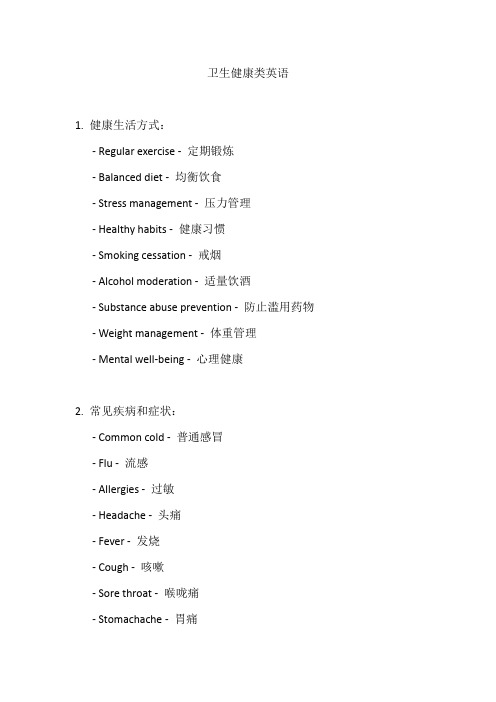
卫生健康类英语1. 健康生活方式:- Regular exercise -定期锻炼- Balanced diet -均衡饮食- Stress management -压力管理- Healthy habits -健康习惯- Smoking cessation -戒烟- Alcohol moderation -适量饮酒- Substance abuse prevention -防止滥用药物- Weight management -体重管理- Mental well-being -心理健康2. 常见疾病和症状:- Common cold -普通感冒- Flu -流感- Allergies -过敏- Headache -头痛- Fever -发烧- Cough -咳嗽- Sore throat -喉咙痛- Stomachache -胃痛- Fatigue -疲劳- Insomnia -失眠3. 医疗服务和专业人员:- Hospital -医院- Clinic -诊所- Doctor's office -医生诊所- Emergency room -急诊室- General practitioner -家庭医生- Specialist -专科医生- Surgeon -外科医生- Pharmacist -药剂师- Therapist -治疗师- Health insurance -健康保险4. 健康问题和预防措施:- Heart disease -心脏病- Diabetes -糖尿病- Cancer -癌症- High blood pressure -高血压- Obesity -肥胖- Dental care -牙齿护理- Skin care -皮肤护理- Sun protection -防晒保护- Safe sex -安全性行为- Regular check-ups -定期体检5. 公共卫生问题:- Epidemic -流行病- Pandemic -大流行病- Hygiene practices -卫生习惯- Vaccination campaigns -疫苗接种活动- Sanitation -卫生设施- Disease prevention -疾病预防- Health education -健康教育- Environmental health -环境卫生- Water and food safety -水和食品安全- Air pollution -空气污染1. Health -健康2. Hygiene -卫生3. Wellness -健康与幸福4. Cleanliness -清洁5. Exercise -锻炼6. Nutrition -营养7. Balanced diet -均衡饮食8. Physical fitness -身体健康9. Mental health -心理健康10. Sleep hygiene -睡眠卫生11. Hand hygiene -手部卫生12. Oral hygiene -口腔卫生13. Personal hygiene -个人卫生14. Vaccination -接种疫苗15. Prevention -预防16. Disease -疾病17. Symptoms -症状18. Medicine -药物19. Doctor -医生20. Nurse -护士例句:1. It's important to maintain good hygiene by washing your hands regularly.2. Regular exercise is crucial for maintaining physical fitness.3. A balanced diet ensures that you get all the necessary nutrients for good health.4. It's essential to prioritize your mental health and seek help if needed.5. Getting enough sleep and practicing good sleep hygiene is important for overall well-being.6. Remember to brush your teeth twice a day to maintain oral hygiene.7. Vaccinations are an effective way to prevent certain diseases.8. If you have persistent symptoms, it's advisable to consult a doctor.9. Nurses play a crucial role in providing healthcare and assisting doctors in treatments.10. Prevention is better than cure, so it's important to take steps to prevent illnesses.。
健康保健的英语词汇

健康保健的英语词汇关于健康保健的英语词汇健康保健是指人体在疾患之前的'预防,疾患之中的紧急处理,饮食搭配等方面的处理等。
以下是小编带来的关于健康保健的英语词汇,欢迎阅读。
cough 咳嗽asthma 哮喘pneumonia 肺炎heart disease 心脏病arrhythmia 心律不齐indigestion 消化不良gastritis 胃炎appendicitis 盲肠炎hepatitis 肝炎dermatitis 皮炎freckle/ephelis 痣,雀斑acne 粉刺flu 流感diarrhoea 痢疾quarantine 检疫vaccinate 打疫苗endemic 水土不服relapse 复发症casualty 急症stupor 昏迷sprain 扭伤scalding 烫伤graze 擦伤scratch 搔挠trauma 外伤bruise 淤伤fracture 骨折dislocation 脱臼tinnitus 耳鸣trachoma 沙眼colour blindness 色盲nearsightedness/myopia 近视astigmatism 散光gingivitis 牙龈炎cavity 龋齿fever 发烧discomfort/disorder 不适malnutrition 营养不良incubation 潜伏期asthenia 虚弱poisoning 中毒fatigue 疲劳heat stroke 中暑itching 发痒ache/pain 痛tetanus 破伤风night sweat 盗汗chill 打冷颤pale 脸色发白shuddering 发抖inflammation 炎症acute 急症chronic 慢性病congenital 先天性病nausea 恶心vomit 呕吐。
